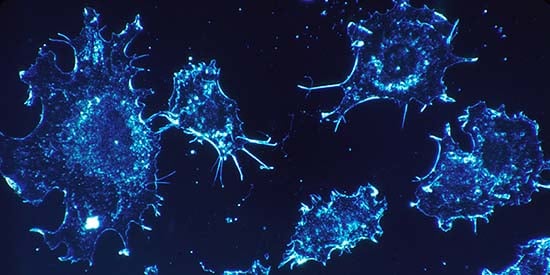French president signs off on new cancer research collaboration with Deakin
Media releaseDeakin University will collaborate with a group of French research institutions and the University of Tasmania on a new international cancer research laboratory, after a special agreement signed by French President Emmanuel Macron and Australian Prime Minister Malcolm Turnbull at Admiralty House today.
The collaboration will include formation of a Laboratoire International Associé - a 'laboratory without walls' - and will be part of a world-leading program established by France's National Research Institute, the Centre National de la Recherche Scientifique (CNRS).
Deakin's Deputy Vice-Chancellor (Research) Professor Peter Hodgson joined Patrick Nédellec, Director of CNRS’s European Research and International Cooperation Department, and Professor Brigid Heywood, Deputy Vice-Chancellor (Research) at the University of Tasmania, for the signing ceremony.
Professor Hodgson said the 'Roles of Cancer in Ecology and Evolution International Associated Laboratory' signified a research collaboration of great strategic importance for the University.
"Through this new laboratory we will continue to further our commitment to support the communities we serve through globally significant research," he said.
"This underscores Deakin's strong expertise in ecological science, evolutionary science and cancer research.
"Cancer is not only a major cause of human death worldwide that touches nearly every family on the planet, but also a disease that affects all other multicellular organisms.
"Despite this, oncology and other biological sciences such as ecology and evolution have until very recently developed in relative isolation.
"The project will apply evolutionary principles and ecological approaches to cancer that will greatly enhance our understanding of cancer ecology and evolution, as well as improve cancer prevention and therapies."
The laboratory project was spearheaded by Dr Beata Ujvari, a Senior Lecturer in Bioinformatics and Genomics at Deakin's Centre for Integrative Ecology within the School of Life and Environmental Sciences, and CNRS Research Director Frederic Thomas, both of whom will be Scientific Coordinators of the LIA.
Dr Ujvari said the laboratory would reshape the conceptual landscape of cancer biology, evolutionary ecology and biology, breaking new ground in its transdisciplinary approach.
"The laboratory will draw on specialists working in mathematics, cell biology, evolutionary biology, and behavioural ecology to understand the role of cancer in ecological and evolutionary processes," she said.
"It will build on our existing work looking at zebrafish to study cancer ecology and evolution under controlled laboratory conditions. As well as our research into transmissible cancers - particularly the Tasmanian devil and its Facial Tumour Disease, and bivalves and their disseminated neoplasia - to study cancer ecology and evolution in the wild.
"The knowledge generated will have broader implications for cancer research and treatment, as well as conservation management of endangered species such as the Tasmania Devil, and the preservation of organisms with high economic value like bivalves."

